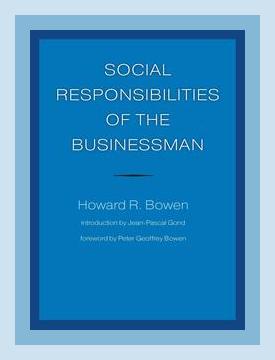Business Law and EthicsCorporate Social Responsibility
Introduction
“Social Responsibilities of the Businessman” by Howard R. Bowen is widely regarded as one of the foundational texts in the field of Corporate Social Responsibility (CSR). Published in 1953, the book argues that businessmen (and by extension, businesses) have ethical obligations that go beyond the pursuit of profit. Bowen delves into the responsibilities that companies have towards society, examining the economic, legal, ethical, and philanthropic dimensions of these responsibilities. The work’s significance lies in its early articulation of concepts that would later be central to CSR.
Major Points and Concrete Examples
1. The Concept of Social Responsibility
– Major Point: Bowen defines social responsibility as the obligation of businessmen to pursue policies, make decisions, and follow lines of action that are desirable in terms of the objectives and values of society.
– Specific Action: A manager can evaluate the company’s policies to ensure they align with societal values, such as fairness and environmental sustainability.
– Example: Bowen cites the example of a textile company adopting fair labor practices even when it wasn’t legally required, demonstrating respect for workers and society’s growing concern for human rights.
2. Economic Responsibilities
– Major Point: Businesses must be economically viable to fulfill any social responsibility. Profitability is key, but should be achieved ethically and sustainably.
– Specific Action: Businesses can regularly audit their financial practices to ensure profitability does not come at the expense of unethical behavior.
– Example: Bowen mentions a mining company investing in safety equipment and training for workers, which initially increases costs but leads to long-term profitability through reduced accidents and higher morale.
3. Legal Responsibilities
– Major Point: Companies must adhere to laws and regulations as a fundamental aspect of their social responsibility.
– Specific Action: Implement a compliance program that ensures the firm is up-to-date with all current laws and regulations.
– Example: A food manufacturing company complying with health and safety regulations to prevent foodborne illnesses showcases commitment to consumer well-being.
4. Ethical Responsibilities
– Major Point: Businesses should do what is right, just, and fair, even beyond legal obligations. Ethical responsibilities include a wide range of practices that are morally commendable but not legally mandated.
– Specific Action: Creating an ethics committee within the organization to oversee fair practices and decision-making rooted in moral principles.
– Example: Bowen discusses a retailer choosing to honor misleading price advertisements due to an internal error, thus maintaining consumer trust and goodwill despite the financial loss.
5. Philanthropic Responsibilities
– Major Point: Businesses should voluntarily contribute to the broader community welfare through philanthropy, such as donating to charities or funding community projects.
– Specific Action: Establish a corporate foundation that supports local community initiatives.
– Example: Bowen references a company that supports educational programs in its local area, improving the community’s socio-economic conditions while also cultivating a better-educated workforce.
Implementation Strategies
1. Integrating Social Responsibility into Business Strategies
– Major Point: CSR should be integrated into the core business strategy rather than being an afterthought.
– Specific Action: Incorporate CSR metrics into performance evaluations and strategic planning processes.
– Example: Bowen describes a firm that ties executive bonuses to social performance indicators, incentivizing leaders to prioritize ethical practices alongside financial success.
2. Transparency and Communication
– Major Point: Being transparent about business practices and decisions helps build trust with stakeholders.
– Specific Action: Regularly publish a CSR report detailing the company’s initiatives, outcomes, and future goals.
– Example: A public utility company that shares its annual environmental impact report with the community and stakeholders, fostering a sense of accountability.
3. Stakeholder Engagement
– Major Point: Businesses should engage with stakeholders—customers, employees, suppliers, community members—to understand their concerns and expectations.
– Specific Action: Set up regular stakeholder meetings to gather input and feedback on company policies and practices.
– Example: Bowen highlights a manufacturing company holding quarterly town hall meetings with local residents to discuss environmental impacts and community concerns.
4. Education and Awareness
– Major Point: Educating both employees and the public about the importance of social responsibility helps in nurturing a culture of ethical business.
– Specific Action: Develop and run internal training programs focused on ethical decision-making and CSR principles.
– Example: An automotive company sponsors workshops on sustainable practices and the importance of ethical labor standards, ensuring that employees at all levels understand and commit to these principles.
5. Adapting to Social Changes
– Major Point: Businesses need to be flexible and adapt to social changes and evolving expectations.
– Specific Action: Conduct regular socio-economic trend analyses to anticipate and prepare for changes in societal values and regulations.
– Example: Bowen references a company proactively adopting eco-friendly technologies before they are mandated by law, reflecting a commitment to environmental stewardship.
6. Promoting Fair Competition
– Major Point: Honest competition encourages innovation and fairness in the market.
– Specific Action: Advocate for and adhere to fair competition practices within the industry, avoiding monopolistic behaviors.
– Example: Bowen describes a tech company actively supporting antitrust laws and encouraging open standards to promote fair competition and innovation.
Conclusion
“Social Responsibilities of the Businessman” by Howard R. Bowen serves as a pioneering text that lays the groundwork for understanding and implementing Corporate Social Responsibility. Bowen argues that beyond economic performance, companies have legal, ethical, and philanthropic duties to their stakeholders and society at large. He uses concrete examples to illustrate how businesses can act responsibly and sustainably, setting a template that remains relevant today. Through detailed strategies on integrating social responsibility, transparency, and stakeholder engagement, Bowen’s work provides actionable insights for businesses aiming to fulfill their broader social obligations.
